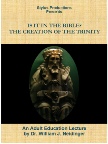
Site and content copyright © 2017 by Stylus Productions. All rights reserved.
IS IT IN THE BIBLE?
EARLY CHRISTIAN BELIEF & PRACTICE
VIDEO LECTURES by Dr. William J. Neidinger
1. Who Was the Messiah Supposed to Have Been?
The concept of the Messiah was a late and vague development within Judaism. By the first century BC, nearly all Jews believed in a Messiah who would save them from their present travails. But beyond that, there was little agreement. The new belief in a Messiah required a colossal re-interpretation of Scripture that allowed Jews to mine their writings for Messianic prophecies.
2. Jesus of Nazareth as God and as Man
After Paul proposed the redemptive nature of the Crucifixion and Resurrection, and after John equated Jesus with the Logos, the question of whether Jesus was the Messiah or not came to pale in comparison. The debate now came to center on the nature of Jesus’ divinity; here Greek philosophy proved more useful than the Bible. But a Biblical foundation was still required.
3. The Creation of the Trinity
If Jesus was accepted as divine, how did that compromise traditional Jewish monotheism? And how did the Spirit fit into the equation? Christians dragged Greek philosophical terminology and concepts into their debate and tried to co-relate them with Scripture. But problems arose as the concept of a Trinity became more accepted, because of the confusion of translating Greek into Latin terms and vice versa.
4. Mary: From Virgin to God-birther to Immaculately Conceived
Despite being mentioned only 19 times in the New Testament, Mary came to assume a position second only to God in Christianity. Christians came to believe not just in the Virgin birth, but in Mary’s perpetual virginity, her birthing of one of the Godhead, and her immaculate conception. And it was quite a challenge to find Biblical backing for these doctrines.
5. The Cult of the Saints and Martyrs
Continuing in the age-old traditions of the Jews and pagans, Christians early on started collecting and venerating the remains of their holy men and women. But relic veneration easily lent itself to abuse: fraud, theft, superstition. The Church had to rein in the popular enthusiasm for relic promotion, a task particularly made urgent by the onset of the Protestant Reformation.
6. The Sanctification of Chastity, Virginity and Marriage
The early Christian code of sexual ethics relied little upon the sayings of Jesus, the ideas of Paul or the examples of the Apostles. Rather, it was a gradually evolving morality that drew upon the Old Testament, Greek philosophy, and the myriad local traditions of the various peoples of the Roman Empire.
7. The Sacraments
The number of sacraments (7) was not made official until the 15th century. Before that time there was intense debate as to not only the number of sacraments, but also what constituted a sacrament, how a sacrament operated, who could administer a sacrament, and what transpired during the administration of a sacrament.
8. Sin, Satan and Judgment
Early Christians introduced a new concept into the salvationist debate of antiquity: free will. It absolved man of collective guilt, cultic uncleanliness and ritual impurity. Or did it? What about original sin? What, then, was the role of baptism and penance? Why does man sin, and what are the consequences? And what part did God’s angel, Satan, play? Satan’s character changed drastically from the Old to the New Testament. The debates were fierce in the early Church.

Watch
on Amazon
or Vimeo on Demand
Series also available on DVD:
$55.00
Buy item 391 DVD

Is It In the Bible
Series at AMAZON VIDEO
AVAILABLE WORLDWIDE ON VIMEO ON DEMAND


Purchase or rent individual lectures or the entire series.
New special pricing for the entire IN THE BIBLE series.








1
2
5
6
3
4
7
8

"Is It In the Bible?"
Lecture Notes
Printed book and e-book available at
Notes in PDF format will be provided
with DVD purchase.